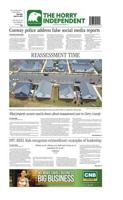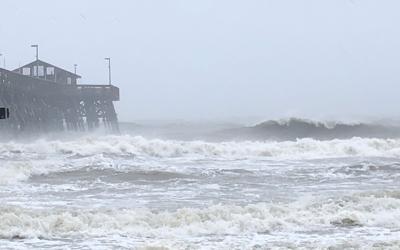Hurricane season has returned.
June 1 marks the start of the Atlantic hurricane season, which runs until Nov. 30.
This year, the National Oceanic and Atmospheric Administration predicts a near-normal hurricane season with 12 to 17 named storms, with winds of 39 mph or higher. Five to nine storms could become hurricanes and one to four of those could be major hurricanes, according to NOAA's forecast. Major hurricanes include categories three, four and five in which winds could be higher than 111 miles per hour.
For comparison, the administration predicted the Atlantic would have an above-normal 2022 hurricane season and last year ended up seeing 14 named storms and eight hurricanes, including Hurricanes Ian, Nicole and Fiona.
Regardless of the predictions, however, it only takes one bad storm to alter lives.
“We’re always telling everybody and all the communities to just be mindful that one storm could be enough to create catastrophic damage,” said Maria Torres, a meteorologist with NOAA. “It is important to be prepared.
“Our peak is usually around that August and September timeframe, so it’s always very important to keep an eye on that and always start getting prepared now,” she said.
South Carolina is ranked number three in terms of having building codes and infrastructure that are the most prepared to survive natural disasters, according to a ranking system by the Insurance Institute for Business & Home Safety, a nonprofit that researches storm preparedness.
Florida is ranked first and Virginia is ranked second.
While the Grand Strand fares better than many coastal areas in terms of having sound infrastructure built with hurricane season in mind, as determined by IBHS’s ranking system, there are still safety measures locals should take to prepare for potential storms.
The most helpful precautions homeowners can take before a storm is sealing areas where water could enter, cleaning gutters, trimming hazardous tree branches, having a roof inspected and checking in on an insurance policy, said Sarah Dillingham, a senior meteorologist and director of product design for IBHS.
“Go to a local hardware store and buy some caulking and stuff to seal any gaps around windows or doors that's going to help prevent water from getting in,” she said. “Look at your gutters and downspouts and make sure that those are properly secured and they're cleaned out.
“Any trees that are close to the house that are not looking so great, have a licensed arborist come out and check it out. … Having a roof inspection is really good, but be careful because after storms, unscrupulous characters will come out and say, ‘We gotta go inspect your roof.’ Have that list of trusted roofing contractors. … You want to make sure that your insurance policy is still sufficient to cover any losses that you would see in your home.”
Dillingham also said that when renovating a home, people should be storm-minded. She said people should consider storm-grade garage doors as important as new granite countertops.
IBHS has resources on their website to help inform homeowners in renovating their homes to make them storm-ready.
As for when a storm is on its way, the best thing to do is keep up with whether-related evacuations.
“If you're going to evacuate, make sure your doors are closed and secured, garage doors are closed and everything is closed,” Dillingham said. “A lot of people might not know this, but if wind should get into your home, say a window is broken or something, the wind will rapidly fill the room. But if you've got the doors closed, the interior doors closed, that will help to compartmentalize the wind and reduce the uplift strength on your roof. And it can reduce it by as much as 30% we've seen in some cases.”
And when sheltering in place, be in the most interior room of the home, she said.
“Regardless of forecasts, we always want to make sure that people are prepared because if you're the unlucky one that gets the one storm that year that was the big one, then the impacts are very real and if you weren't prepared, you're just that much more likely to potentially see damage,” she said.
The NOAA will have another hurricane season update on the administration’s predictions in August.
Here are local resources for the Myrtle Beach and Horry County area:
- What to know before a hurricane, via Horry County Emergency Management
- South Carolina Emergency Management's Know Your Zone guide
- Preparing along the coast, via the city of Myrtle Beach



















(0) comments
Welcome to the discussion.
Log In
Keep it Clean. Please avoid obscene, vulgar, lewd, racist or sexually-oriented language.
PLEASE TURN OFF YOUR CAPS LOCK.
Don't Threaten. Threats of harming another person will not be tolerated.
Be Truthful. Don't knowingly lie about anyone or anything.
Be Nice. No racism, sexism or any sort of -ism that is degrading to another person.
Be Proactive. Use the 'Report' link on each comment to let us know of abusive posts.
Share with Us. We'd love to hear eyewitness accounts, the history behind an article.